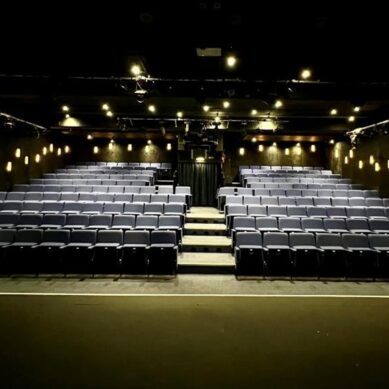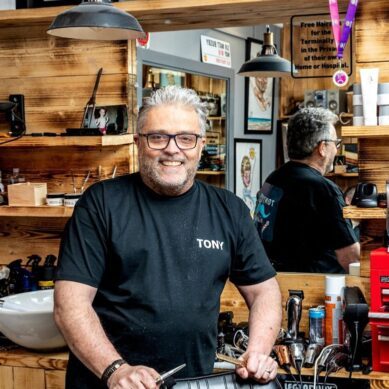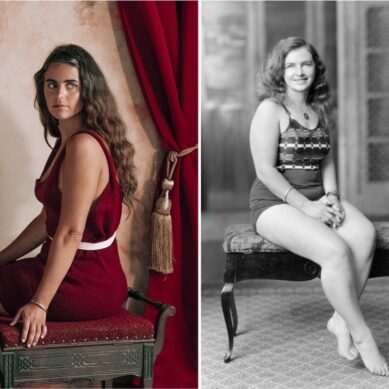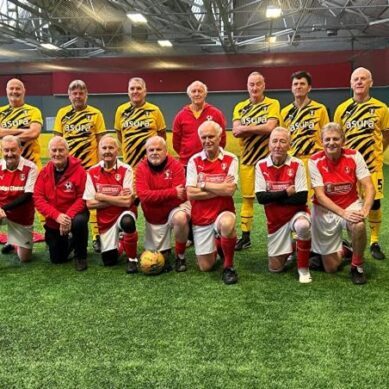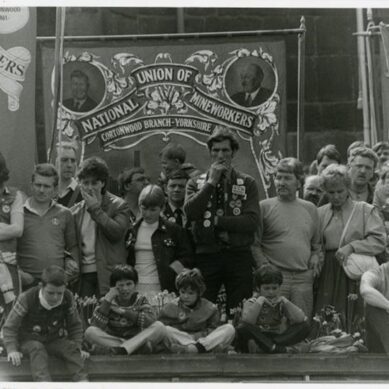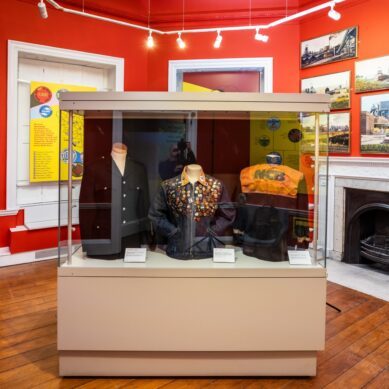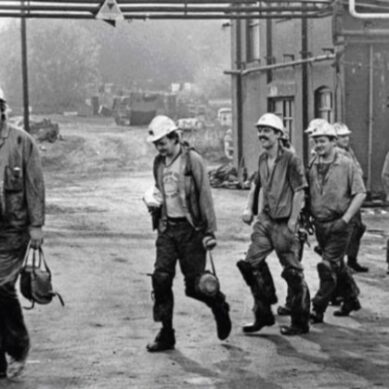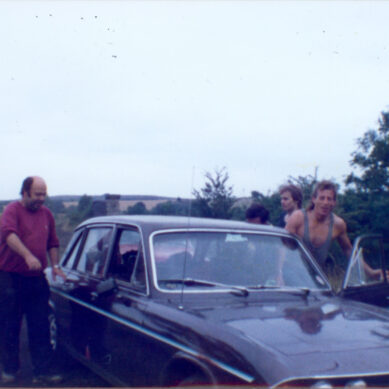With their fluorescent jackets and liveried motorbikes emblazoned with the word BLOOD, you could be forgiven for thinking that these riders are yet another part of the NHS’s frontline fleet.
They work tirelessly through the night to transport urgent and emergency blood and pathology samples between hospitals and hospices, providing an indispensable service at critical times.
Yet the unsociable hours that these riders spend on the roads during their 12-hour shifts, racking up tens of thousands of miles every year, doesn’t come with a top salary to endorse the work they do.
For the riders at Whiteknights Yorkshire Blood Bikes are all volunteers who do it for the hell of it.
Forget the vision of leather-clad hairy bikers – they’re protagonists not anarchists; divine messengers delegated with delivering a service which not only saves lives on two wheels, but also goes the whole hog to save money for the NHS.

While there are many selfless volunteers in this world, the Whiteknights are a paragon of gallantry, cavaliers who go far beyond the call of duty by pulling on their boots and helmets whatever time of night the phone may ring.
From transporting blood for life-saving transfusions in major trauma cases, to donor milk for babies in neonatal care, or essential palliative care supplies for hospices, the Whiteknights have been independently supporting the NHS for over ten years with their free out-of-hours service.
Yet the nocturnal nature of their work means few are aware of the significant impact that charitable organisations like Whiteknights have on our healthcare service.
Whiteknights is a founder member of the Nationwide Association of Blood Bikes and was part of the first cohort of UK-based blood bikes to form in 2008.
Back then, a co-founder of Whiteknights, Vic Siswick, was in hospital when clinical transport was needed during the night. The NHS’s in-house courier provision only operates Monday to Friday 9am till 5pm so Vic’s imminent healthcare needs was in the hands of a local taxi firm.
Vic was an avid motorcycle rider and realised that using motorbikes to support the NHS courier service could speed up delivery times compared to a taxi or ambulance due to the control and agility advanced riders have on a bike.
And so, Whiteknights was born.
Originally, they just covered West Yorkshire and, as riders must live within eight to ten miles of the main locations, volunteers came mainly from that area.
Then, in 2014, a South Yorkshire branch was launched by a group of advanced riders who wanted to be a part of the action.
Paul Andrews, from Rotherham, was one of the founder South Yorkshire members along with Wayne Morris and Kevin Morley.
A teacher for over 20 years, Paul was off work ill when he saw a TV programme about emergency bikers including the police, paramedics and West Midlands Blood Bikes. Paul has been riding since 1987 and thought the idea of being a blood biker sounded interesting but was a bit far out of Whiteknights’ catchment area.
The following year, together with Kevin and Wayne and enough support from other riders, a South Yorkshire development team was launched and the rest is history.
Whiteknights is now made up of three branches – North, West and South – which cover the majority of Yorkshire.
There are currently around 60 volunteer riders overall who are rostered to do 12-hour shifts during evenings and weekends; either Monday to Thursday 7pm till 7am, or from 7pm Friday to 7am Monday which is split into four shifts.

Many riders, like Paul, fit their shifts in around work and family commitments which, for the unknowing general public like us, is hard to fathom.
“I no longer teach but I care for my mother full time and my autistic daughter part-time, as well as working two days a week at Citizens Advice Bureau and teaching tai chi.
“The appreciation makes the long days and nights worthwhile. Even now, I’m still humbled by the reaction and praise we receive from the public and other bikers,” Paul says.
While many riders are retired, others, like recent recruit Ian Culf from Sheffield, run businesses but still want to do their bit to help make a difference despite being saddled with their own responsibilities.
“I’m a self-employed joiner so I could be delivering blood at 6am and on a roof at 8.30am. I was picking some samples up at 3am from Sheffield Children’s Hospital recently and the woman on reception asked me what I was doing after. I said I was going back to bed because I was shattered.
“She looked at me in horror like I was skiving and said, ‘I thought you were supposed to be on shift?’ She couldn’t believe I’d been working my ‘proper’ job that day and would be working again a few hours later,” Ian says.

Personal motives led to Ian joining Whiteknights last September. His father was diagnosed with an aggressive form of leukaemia towards the end of 2018 and died in the November.
“I decided that in the New Year I was going to pay back the NHS for the excellent care my dad received by volunteering in some way. I came across Whiteknights and, having been a keen rider for over 20 years, took my advanced rider test and became actively involved last September.
“Since I joined, everyone I’ve met at Whiteknights has been totally genuine; they’re a fantastic group of people. We come from different walks of life, different ages, but we all have one interest in common – helping others.”
In South Yorkshire, Whiteknights work with all the major Sheffield hospitals and some hospices, encompassing a range of people they help.
From the start of life at Jessop Wing maternity unit to those at end of life at St Luke’s Hospice, the Whiteknights riders are on-call through the night and every weekend to deliver whatever is needed for someone’s urgent or critical care.
“Bikers like myself mostly ride for pleasure with no time restrictions and usually a cup of tea at the end of it. This is a completely different format – our cargo could save a life.
“It’s a very rewarding role; even if you don’t get called out you still feel happy that nobody is sick enough to need us. But if you do get a call, you’re playing a small part in helping someone you will never meet,” Ian says.
Although the majority of their deliveries are nameless, the onward journey undisclosed, Whiteknights South Yorkshire members were fortunate to encounter one of their beneficiaries last year who waivered his right to patient confidentiality to publicly thank them.

John Bulliman, from Bawtry, needed irradiated blood for a transfusion to prevent him from developing the rare, but often fatal, transfusion-associated graft versus host disease (TA-GVHD).
Due to the process irradiated blood must undergo, it needs to be ordered and there wasn’t any available in Sheffield where he was receiving treatment for leukaemia and sepsis. The Whiteknights collected it from a relay of other bikers during transportation almost 100 miles up the country from Birmingham.
“I didn’t see them unfortunately as I was in no condition, but I am so grateful that they do what they do as without them I wouldn’t be here today,” John says.
John is a Sheffield freemason and a member of Ivanhoe Lodge 1799. As thanks for Whiteknights’ part in saving John’s life, the club unanimously decided to donate a substantial amount of money to purchase a new bike and cover the running costs for three years.
The keys to ‘Ivanhoe’, a BMW R1200RTP Police-spec bike, were graciously handed over at a ceremony at Tapton Hall at the beginning of last year.
Ivanhoe is the latest in a convoy of six bikes that belong to Whiteknights which also includes an electric car for when temperatures are too low to carry blood on a bike. Each bike costs around £18,000 to buy and a further £6,000 per year to run, due in part to the exponential mileage of around 40,000 miles that each bike travels over two years.

In South Yorkshire, they have two bikes – Ivanhoe, and Lionheart which was donated by Rotherham Lions Club in 2014 funded by profits from their Rawmarsh charity shop.
They have kindly been given a hub at Northern General Hospital in Sheffield where the two riders on shift each collect a bike to keep at home overnight so they can respond immediately to any calls.
While many riders can expect to be called out once or twice a night, there is no guarantee that the phone will ring so the volunteers are encouraged to go home and sleep after each delivery if they’re covering the night shift.
But during busier periods, the phone may constantly ring like it did for Whiteknights South Yorkshire’s only female rider, Annette Parker, who had nine calls during one shift.
“Every time I got home there was another call and you know when it’s in the middle of the night that these are very important requests for very sick people, particularly children. Getting out of bed and back out on the bike nine times was hard but there is no way you’d ever reject a call or try and sleep.
“Afterwards I was absolutely shattered. You might not be able to do much the next day but you know you’ve been part of a machine that’s helped people and that is very valuable,” she says.
The regional record for the most call-outs in one shift from 7pm to 7am is currently held by a former deputy manager of Whiteknights South Yorkshire who responded to 14 calls one night.
Since the launch in 2014, South Yorkshire Whiteknights have responded to over 5,000 urgent and emergency calls, averaging more than one per day. Last year, they received 385 calls which included 36 deliveries over the Christmas period.
Across Yorkshire as a whole, Whiteknights responded to 1,918 call-outs during 2019. Within the first month of 2020, they received over 200 call-outs for their service, with it set to be another busy year ahead.
Often, due to the urgency of the matter, the race is on to deliver the sample as quickly and safely as possible. Blood bikers have the option to use a flashing blue headlight if there is danger to life but generally they must abide by traffic laws and the Highway Code, meaning they cannot run red lights, exceed speed limits or use the hard shoulder of a motorway like other blue light users can.
Despite their name, they don’t just carry blood like many people assume.
Along with biochemistry and haematology samples, their consignments may also include controlled drugs, vital medical supplies, or even documents and x-rays.
If it wasn’t for Whiteknights, these would be sent in transit by unreliable and unregulated private taxi or courier services – who knows what conditions that vital delivery has been in on its journey.
A litre of donor breast milk for a hospital’s special care baby unit costs around £130 so care needs to be taken to not only control the temperature but prevent any spillages of this liquid gold.

At Whiteknights, their procedure is similar to that of delivering a parcel.
Each order is given a consignment number which can be tracked and updated by both parties. Samples are kept in sealed containers which are transported in the bike’s pannier.
Of course, there is only so much you can fit on the back of a motorbike, so Whiteknights are entrusted with delivering emergency or urgent jobs. Yet a motorbike can transport eight doses of palliative drugs to a hospice whereas an ambulance can only hold two.
As an independent charity, Whiteknights saves the NHS serious money each year. It is estimated that for every £1 donated to a blood bike group, the NHS saves £5 which would usually have been spent on expensive private taxi or courier hire.
They are also mindful of keeping costs to a minimum within the charity in order to use funds for the bike maintenance and fuel, so volunteers each provide their own equipment which includes boots, trousers, jacket and helmet plus a high-vis standardised uniform for visibility on the roads.
For South Yorkshire’s deputy manager, Chris Taylor, when he joined Whiteknights last August he needed a special pair of boots due to severe arthritis which had left him unable to wear closed-toe shoes for five years due to the pain.
He found The Cordwainer in Bradwell, specialist makers of orthopaedic footwear, but their bespoke boots made especially for Chris would cost him £1,500.
Fortunately, the Royal British Legion generously paid for his boots, thanks in part to Chris’ father being a former Royal Navy Gunner who was disabled during the war, the explosions perforating his eardrums.
Thanks to his new boots, being able to assist with Whiteknights’ service has now given Chris a sense of pride and purpose back.
“I have many serious health conditions and felt like my life was going down the pan; I was really struggling. But volunteering at Whiteknights has helped me so much.
“I’ve ridden bikes since I was eight when my dad brought a clapped-out Honda home. Both he and my mother were avid bikers and Mum was a nurse at the Hallamshire. She’s now got Alzheimer’s and needs care so this is my way of keeping their legacy going,” Chris says.
Most regions across the country now have a blood bike group that assists the NHS. Surrounding counties regularly take part in relays whereby samples are delivered across the country via riders from various districts.
For example, prenatal genetic testing is only carried out at Bristol so any amniocentesis samples from the Hallamshire need to be delivered to their Fetal Medicine Unit for diagnostic procedures.
This summer, a new state-of-the-art NHS Blood and Transplant Centre is opening in Barnsley just off junction 37 of the M1, relocating from their former base at Leeds Seacroft Hospital.
Whilst the service will now be more centralised and obviously closer for the South Yorkshire riders to get to, it will also have a big impact on Whiteknights as a whole due to their North and West riders having further to travel, thus increasing call-out time and costs in fuel.
Whiteknights are now hoping they can raise enough money to invest in more bikes and recruit new volunteer riders to help ease the workload and improve waiting times.
To join Whiteknights as a rider, you must be at least 30 and an advanced rider with an IAM, RoSPA or Police qualification with no more than six penalty points on your license. There is no upper age limit, with the oldest rider currently in their mid-70s.
If you feel like you could support Whiteknights in any way, from being a rider or donating money to support the cause, they would love to hear from you. www.whiteknights.org.uk
Follow their Facebook page to see more photos and videos.
